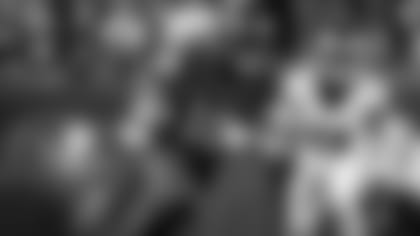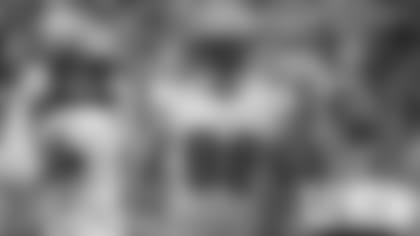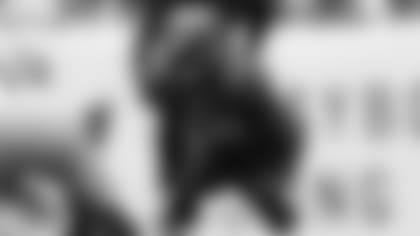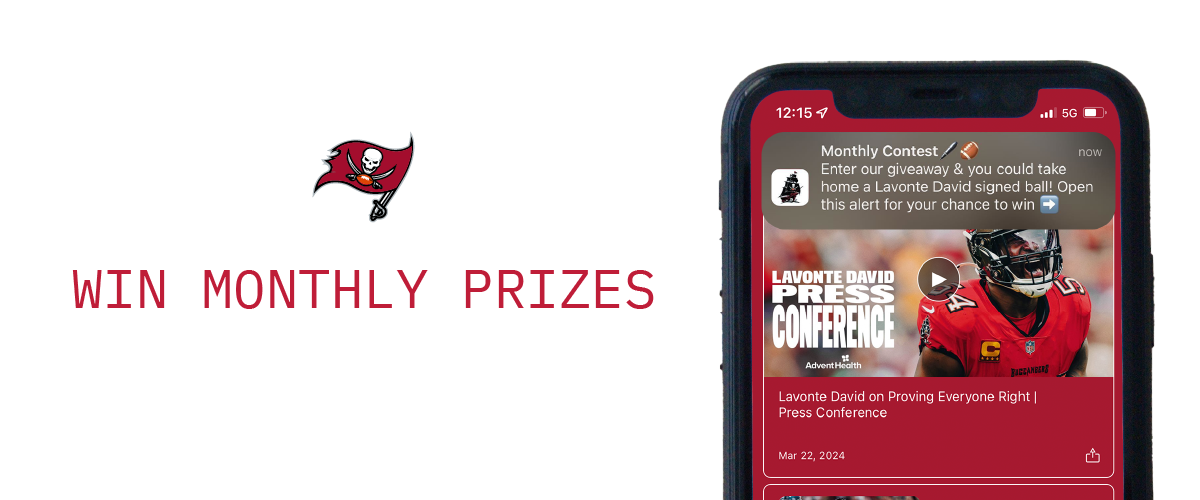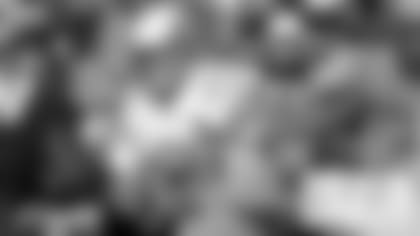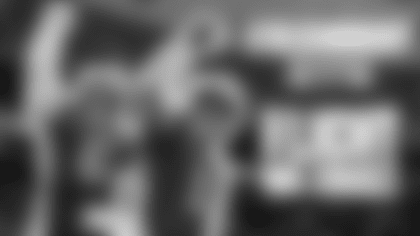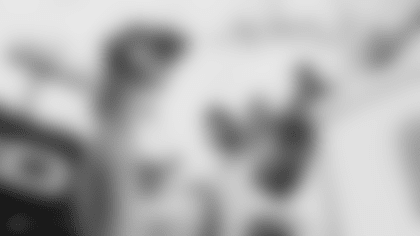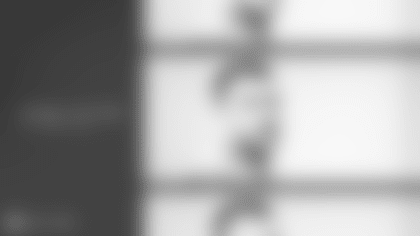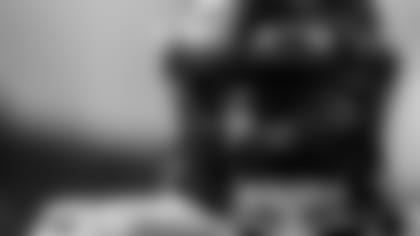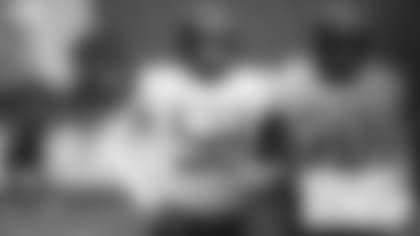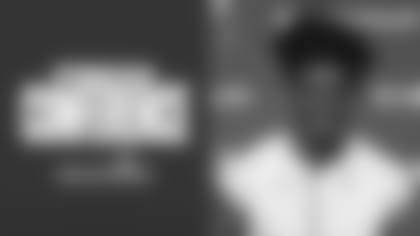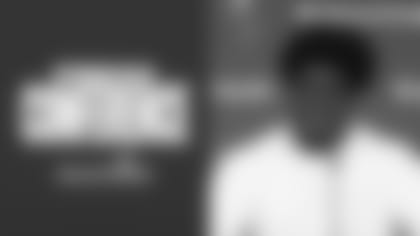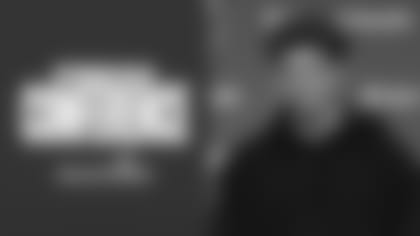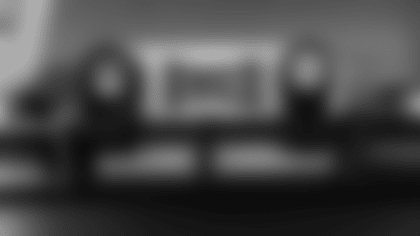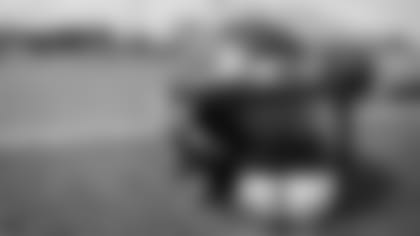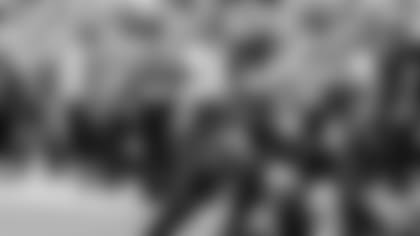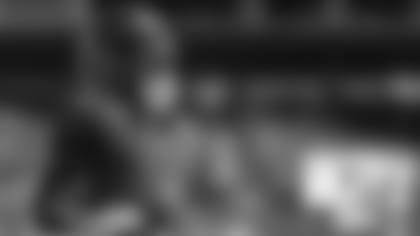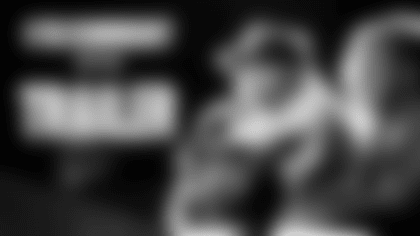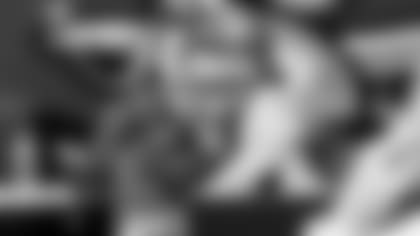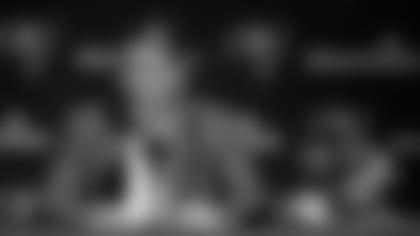Below is a selection of Tampa Bay Buccaneers quotes from today's earlier media availability. Full video of press conferences can be found on Buccaneers.com.
Defensive Coordinator Todd Bowles
Special Teams Coordinator Keith Armstrong
Assistant Head Coach/Run Game Coordinator Harold Goodwin
Defensive Coordinator Todd Bowles
(On his loyalty to Bruce Arians and 'losing his left arm for him')
"That was a joke first of all – I'm not going to lose my left arm for Bruce. Just from him coaching me in college to us coaching together before in Cleveland to going to Arizona and the trust and the relationship we developed from that standpoint and the knowledge from a football standpoint that I gained from him, the things I've learned from working with him and working under him as a player when we were back in school. It's been a good setup for me and it's been great knowledge for me and he's helped me a great deal."
(On where his 'attack' mentality originated from)
"I think it was from Arizona. We had at that time blitzed quite a bit at that time. Most of it was the illusion to pressure as opposed to pressuring itself. A lot of guys came free and we had some good athletes on that team. They made me look good."
(On the transition from head coach to defensive coordinator)
"I get to concentrate on defense 24-7. As a head coach, your job expands doing a lot of other things, but being a defensive coordinator now just concentrating on things I love to do – it's going to help me a great deal."
(On whether he will coach a 3-4 or a 4-3 defense)
"I've coached half of my career in a 4-3, the other half in a 3-4. I think you coach according to what kind of players you have and what kind of guys you can put where. We're going to be versatile, regardless. As I watch the tape and watch the film, we'll morph into one of those things, if not both of them, but we need to be versatile, regardless.
(On his impressions of Bruce Arians when they met at Temple University)
"When he first got to Temple, we were already there back in '83 and he came from Alabama and Bear Bryant and he employed this eight-man front to stop the wishbone and all this type of football and were playing against Dan Marino and [Todd] Blackledge and [Rich] Gannon and [Doug] Flutie. On the East Coast, [they] threw the ball. We were trying to stop the run and nobody was running the football. It wasn't a very good first impression [laughs]. That was my first impression to be honest. He adapted very quickly – Bruce is a sharp guy."
(On if there is something special about the way Arians engages with people)
"I think he's just real. He's a real person. He's a real man and he's going to tell you how he feels. Until you understand that it's not personal and you understand he's going to say what's on his mind and tell you how he feels, then you can respect that from him. He grows on you – believe me – he grows on you. He's trying to get you better and there's always a method to his madness. He'll never admit it, but there's always a method to his madness and he gets his point across. Everybody loves coaching with him, everybody loves playing for him."
(On what he learned from being a head coach)
"Just dealing with people, dealing with adversity, understanding situations on and off the field. Dealing with most of that – even media-wise, it's helped me a great deal. Overall, I think I've grown as a coach and it was a great experience for me."
Special Teams Coordinator Keith Armstrong
(On his overall special teams philosophy)
"We're going to take great pride in our coverage units. There are several things, philosophically, that I can get in to. From a kickoff coverage standpoint, we're going to overpopulate, we're going to squeeze to the ball, we're going to get vertical penetration to the goal line. I don't know if that means anything to anybody here, but we're going to be an aggressive, attacking, physical cover unit. From a punt standpoint, we're going to be a directional punting team. I believe you get more out of your protection and your coverage by doing that. We're not going to punt to the returners. We're going to try to punt the ball to those free releasers – those gunners outside. So we're going try to place the ball outside with hangtime and placement and then go cover the field. From a coverage standpoint, that's what we're going to do.
"I think what's happened with the kickoff return phase of the game – and you can see it happen all across the league – is everybody's going to more of a double-teaming trap-type scheme, where it's double-down and kick out, where I'm going to double the 'four' and kick out to the 'two' and the 'three' and we'll be a double-teaming trap scheme. We'll run counters off of it, 'break-its', that type of thing. We want to be able to attack you in the coverage unit and shut you down and in the return game, we want to hit you. So, we're going to try to find a way to score or set up a score. We're going to go out and we're going to play penalty-free football and we're going to try to go block kicks. But we have to find a way to contribute to a win. I truly believe that when you talk about field position, you're really talking about a team stat because if your offense get three first downs and you punt the ball, you've already got field position. But what we can do is find ways to score or set up a score and that's my job, obviously."
(On his impressions of Tampa Bay's special teams coaching against them for many years)
"I've always had respect for Tampa Bay's personnel because it was always hard to matchup with them because they could run. I think that started back even when coach [Tony] Dungy was here. [They] were fast, it was a fast unit, a fast club. I thought they could run. They were a competitive unit.
"Field goal block – [they] did a nice job there with the field goal block stuff. You had to know where 92, [William] Gholston was. You had to protect against that. There were things in each phase that they did well. Like all of us, you're always trying to hide the things that you don't do well and expose the other person with the things that they [didn't do] well. Overall, I thought they did a good job with their coverage and their return game was solid."
(On the influence Bruce Arians has had on him)
"It goes back to 1987 in Philadelphia, Pennsylvania. Believe it or not, humid as can be, Astroturf field in North Philly – I don't know if any of you have ever been there. Just picture that. My senior year [of college], we're stretching and Bruce walks up to me while I'm stretching and he says, 'Hey man' he says, 'You want to get into coaching?' I said, 'Yeah, coach.' So I was a senior, I was beat up, 190-pound fullback, I wasn't going anywhere. I was going to try to get my master's (degree) and become a school teacher and go coach high school ball. So he says, 'I'll tell you what, I got a [graduate assistant] job for you next year. Don't worry about whatever you're going to do after you graduate. Bam, you've got a G.A. job here.' So the fact that he even reached out to me during stretch – it goes back to a story beyond that when you think about it. [In] 1982, I signed with Wayne Hardin [at Temple]. [In] 1983, Bruce comes in from Alabama. I end up coming becoming his starting tailback as a freshman. I'm like, 'OK, I'm getting ready to play some Sunday ball. Three more years of this, I'm going to be ready to rock and roll.' The next thing you know, this guy comes in by the name of Paul Palmer. Next thing I know, I'm second-team tailback. I know he felt bad about that. The next year, another kid comes in by the name of Todd McNair. Now I'm the third-team tailback. Next thing I know, I find myself at fullback. So throughout the course of our playing career, I was a team captain for him my senior year, covered a lot of kicks, played some fullback, but I think he appreciated me because I was already the guy – I was a grinder. He was looking for tough guys, he was trying to run us off and he couldn't run me off. I was like an old cockroach. He was trying to run me off and he couldn't. He really embraced me because I was what he was preaching and what he was pushing for – so toughness, attitude, guys that want to win, guys that want to go to class, graduate. I did everything that he asked me to do so I was a coach. So he offered me the coaching job so I went through that GA year with him.
"Then a guy by the name of Joe Moore – if you look up Joe Moore, Joe Moore was the O-line coach at Pitt for Jackie Sherrill back in the early '80s when everybody on that o-line has a gold jacket now. Joe Moore was our o-line coach at Temple, Joe Moore walks up to me and says, 'Hey, you're doing a really great job here GA-ing at Temple, but you're not going to get a job out of here. I've got two places for you – I've got the defensive coordinator at Iowa, guy by the name of Barry Alvarez. Or I can send you down to Jimmy Johnson at Miami and you can take a GA job there.' I said, 'Coach, don't go no further, I'll take you up on that Miami job.' Now, granted I hadn't been outside the tri-state area – New York, New Jersey, Pennsylvania – all my life other than to go play somebody. So I took him up on the job, went down to Miami, I walk into the defensive meeting room at Miami – Dave Wannstedt, Butch Davis, Dave Campo – bam, end of story. Jimmy goes to the Cowboys, I went to Akron, Oklahoma State three years later because of Jimmy, I end up at Notre Dame because of a guy named Joe Moore, who was the o-line line at Pitt. Then from Notre Dame, I was doing the minority [coaching] internships every summer, a couple of them with Jimmy and one with Dave and that's how I actually ended up getting into the league, but none of that would have taken place if it wasn't for Bruce Arians. I owe that to him. He's always looked out for me. We wanted to get together in Arizona, but I wasn't in a situation to be available. Now, this opportunity finally came so I'm looking forward to working with him."
(On Bruce Arians' blunt and honest style of coaching)
"I've kind of adopted that style of coaching myself. In particular at this level, you're dealing with grown men. They don't want to hear a story, just tell me the truth. That's kind of where he comes from. I think as a player and as a coach, you appreciate that. Don't give me this long story and not give me the truth. Give me the truth. … He will tell you the truth. You won't have to wonder where you stand. That's the great part about it. You can speak your mind and he doesn't hold a grudge against you. Once the conversation is over, it's over."
(On reducing the number of penalties on kick returns)
"I think that the biggest thing that I've found out over the years with penalties is that the penalties are player-related. So you have to address with that specific guy. Usually if you look at the illegal blocks above the waste, it's usually the same person. So what happens is, you've got to put together a cut-up or some type of tape where you're showing them the corrections you've got to get squared away and then also have picture in there – this is what you do in this situation. You have to give them examples of how to avoid that. So if we're going to play penalty-free football, then we've got to exercise our ability to get them to do it by showing them by either drilling it – so to me, if you're having that problem with that specific player, why not tailor that when you're going to hit that phase, say we're going to go punt return on Thursday, 'John Smith' this is your day. All we're going to work on is this – bam. You shine a light on it and when you start to shine a light on some of your issues, you usually get better. To me, fouls, if you look at it, fouls are usually happening to the same person."
Assistant Head Coach/Rung Game Coordinator Harold Goodwin
(Opening statement)
"Just wanted to say I'm happy to be here. I'm excited. It's always good to have the opportunity to work for a guy you've worked with before, a guy that's been a mentor in my life, in Bruce [Arians]. I'm happy to be here and I'm excited for the future."
(On having interviewed with general manager Jason Licht several years ago and how that adds to this opportunity)
"That was a huge part of it. Even in Arizona, when Jason was there, every Monday I'd go sit in his office, get feedback from him, what he thought about the O-line play and things of that nature – or the offense in general – and I think that had a huge effect on me deciding to come here. I had other people call me the last couple days for job opportunities, but having Jason and B.A. – you know, B.A. is like a father to me – having him in my corner, this was a no-brainer to me."
(On the most valuable coaching advice he's received from Bruce Arians)
"'Coach them hard, love them later,' and that's what sticks with me. That's one of the key ones I go by. And then the second one I got from a long time ago when I coached college football and that was, 'Your players are a reflection of you.' So that's how I operate. I have a passion for this profession, I have a passion for the game and I look forward to bringing it here down in Tampa."
(On his coaching style)
"I'm a guy that's going to get the best out of my players. Like I said, my players are a reflection of me so if they're not playing well then you guys can write all the stories you want about me. I'm going to demand nothing but the best, I'm going to get nothing but the best from them. I know a great foundation's been laid here because Coach [George] Warhop is also a mentor of mine as far as O-line play and I look forward to adding on to what he started."
(On his familiarity with Special Teams Coordinator Keith Armstrong, Defensive Coordinator Todd Bowles and the staff)
"I've known that B.A. [Bruce Arians] and Keith have always been close. I've never had the chance to really sit down and get to know Keith, but I've always heard great things about him, between B.A. and other coaches. And Todd, working with Arizona, our offices were right next door to each other so anytime I needed advice on anything, be it from football, family life or whatever it may be, that's where I went to. So, I'm excited to work with him again. I know a lot of pressure is coming as far as blitzes and stuff."
(On how his time as an assistant coach in Pittsburgh helped develop his relationship with Arians)
"Lots of knowledge, just sitting down, talking to him, listening to him, going to his house, just conversing. Just doing the best job I could do. I was an O-line guy – assistant in Pittsburgh without the title. I was technically the quality control, but I did everything. I broke down all the film, the coverages, all the things of that nature and he saw the knowledge that I had. Ever since then I've been with him. I remember being back at the Colts and I'm sitting in the locker room when he became the head coach of the Cardinals and I'm like, I'm the line coach, this is where I wanted to be – coaching the line in the NFL – and he goes, 'What the hell do you think you're doing? You're going with me!' I'm like, 'How?' [He said], 'You're my coordinator, dog!' So that's how I ended up in Arizona and I think it's like 12 years we've been together and when I say he's truly like a father to me, he is. Obviously, I've got my biological father – he's my football dad. So, I look forward to trying to make him happy, win a lot of games for him. I'm just happy to be here."
-BUCCANEERS-


